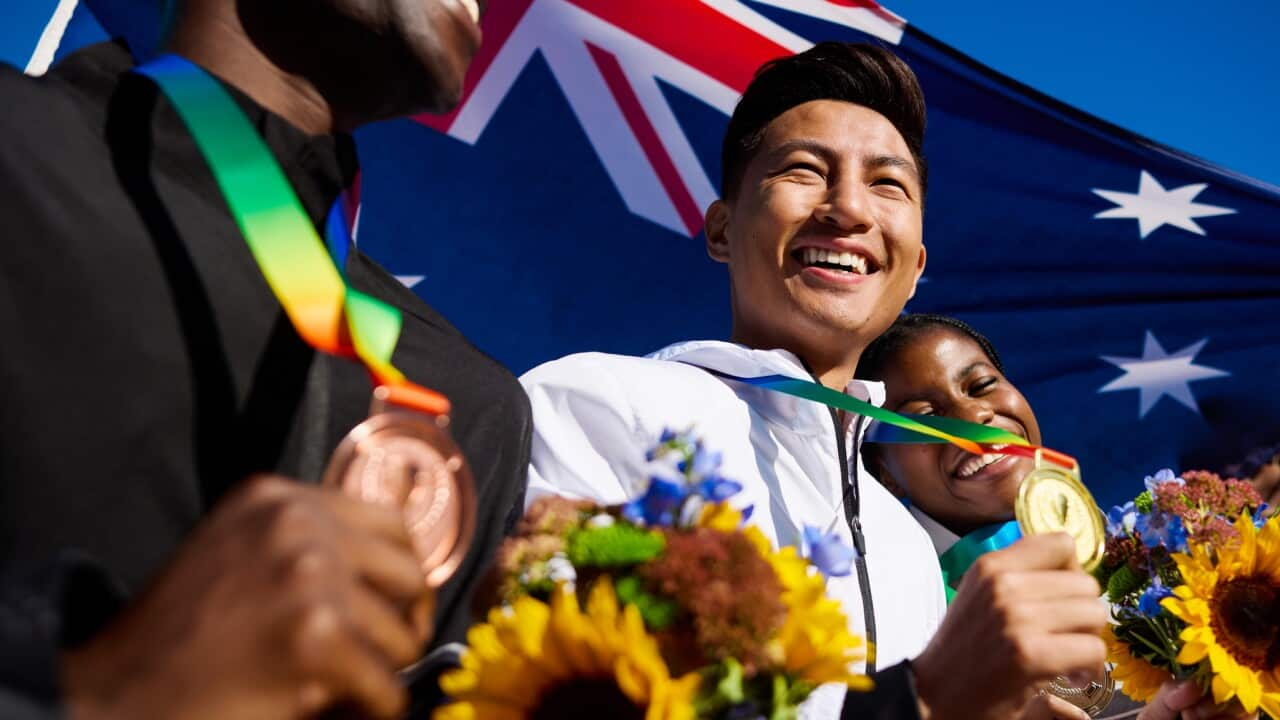英語を理解し話すことは、オーストラリアでの生活を向上させるのにとても役立ちます。ポッドキャスト、では、日々のさまざまなシチュエーションで使えるとっさの英語や表現を、あらゆる例を取り入れて簡単に説明します。
学習ノート
スポーツイベントについて話すときに使えるさまざまなフレーズ:
- That was epic! | That was legendary! | That was outstanding!
- They’re really going for gold!
- He just smashed another record!
- She’s in the running for three medals!
- Have you caught any track events yet?
- I caught the 100m sprint.
- It was crazy close! | It was a neck-and-neck game. | The race was down to the wire.
- The winner just scraped in. | They made it by the skin of their teeth.
- Have you seen any track events yet? (i.e., don’t have any particular past event in mind, any event at any time will do)
- Did you catch the news this morning? (i.e. the news that was broadcast this morning)
- Did you watch the 100m sprint
口語的な言い回し:
Smashes a record ー 記録を大きく更新。
Race, or a game is crazy close ー 接戦、競り合いを指す。他に’neck-and-neck’, や ‘The race was down to the wire’などとも表現できる。
The winner just scraped in ーギリギリで勝利するも容易ではなかった。
‘By the skin of their teeth’ ー ギリギリを意味する。
ボキャブラリー:
To be up to something ー何かを企んでいる。
Epic ー 忘れることができないほどの興奮状態。
Set a new recordー 記録を更新。
A sprint ー 短くて速いレース
文化的な情報:
オーストラリアは夏季、冬季ともに、近代におけるすべてのオリンピックに参加してきました。
ニュージーランドとともに、オーストラレーシアとして参加したこともありました。
またオーストラリアは南半球で初めてオリンピックを開催した国でもあります。
オーストラリアは1956年のメルボルンと2000年のシドニー、計2度の夏季オリンピックを開催しており、2032年にはブリスベンで開催されます。
1956年は総メダル獲得数が3位、2000年は4位でした。金メダルの多くは水泳からです。また、フィールドホッケー、自転車競技、ボート競技、馬術競技、セーリングでも強豪国として知られています。
スクリプト:
(注:これは一字一句書き起こしたものではありません)
SBS acknowledges the Traditional Custodians of Country and their connections and continuous care for the skies, lands, and waterways throughout Australia.
Hi, I’m Josipa, and I’ve been thinking I should stop checking out what my friends in Europe are up to on social media. To be up to something means to be doing something, but we often use it when people are doing something relaxing or even a little bit naughty.
In this case, my friends aren’t being naughty, but they are having fun because it is summer over there and a lot of them are going to visit Paris for the Olympics. It's hard not to feel a little jealous when I see all of them having such a great time– the Mediterranean Sea, delicious seafood, beach parties, and their Paris travelling plans.
And it seems like almost everyone I know in Europe is going! Seriously, so many of my friends back home are even trying to learn some basic French for the Games.
I’ve always been a huge fan of the Olympic Games, because athletes from around the globe come together to compete in all sorts of sports like swimming, running, gymnastics, and a lot of other sports, too.
It’s really exciting stuff, and I really wish I could go. But since I can't, let me imagine it for a moment.
Come on, close your eyes and picture this: You step outside the house, and the summer breeze surprises you with the smell of a fresh croissant. As you walk down the street, passing tables with red and white chequered tablecloths, you hear the music coming from a nearby café. The sidewalks are bustling with people, laughter, and chatter filling the air. You can feel the excitement. Everywhere you look, national flags are decorating shops, TVs are playing sports matches and look, Allan and Clare are also here, and they’ve just finished watching the swimming race.
Claire
Wow, that was epic! We’re really going for gold in the swimming, aren’t we?
Allan
Totally! McKeown just smashed another record! She’s definitely in the running for three medals!
Claire
And have you caught any track events yet?
Allan
Yup, I caught the 100m sprint. It was crazy close! The winner just scraped in.
Whenever there’s a big global sporting event, I feel so lucky because I have two countries to cheer for. One is Australia, of course, and the other is the country where I was born, Croatia.
But no matter how much I love Australia and consider it my home, if I had to pick between supporting one or the other, my heart would probably choose Croatia first.
This realisation makes me feel a bit guilty, but I can’t help it. How about you? If you had to choose between supporting your home country or Australia in a sporting event, which country would you choose first?
Let's talk about it more a bit later, now we need to focus on our dialogue. Claire, first said,
Wow, that was epic!
If something is epic it is so exciting that it is unforgettable. You could also say, ‘That was legendary!’ or, if you were talking in a more formal context you could say, ‘That was outstanding!’
Claire also said,
We’re really going for gold in the swimming, aren’t we?
Claire said that the team were ‘going for gold’ meaning that they were putting in an enormous effort and hoped to win gold medals. We can also use this phrase in other areas of our life where we are making a huge effort and we want to achieve the best possible outcome.
Allan agreed because he replied,
McKeown just smashed another record!
When an athlete smashes a record, they break it in a big way by doing better than anyone has done before. They set a new, improved time or score. They set a new record. Allan also said,
She’s in the running for three medals!
This means that she has a good chance of winning three medals, so in the Olympic games, these could be gold, silver or bronze.
You could use the phrase 'in the running for' in a lot of different situations. For example, if it's very likely that you'll get promoted at work, I could say that you're in the running for a promotion, that is, to get a job at a higher level.
Or if your kid just joined the drama class, you could say that they're in the running for the lead role.
Remember how Claire asked Allan if he saw any track events. These are races or competitions on a running track? She said,
Have you caught any track events yet?
Have you caught any track events yet? The word 'caugh' is a past simple form of the word 'catch'. And, in this context, to 'catch' an event means to 'watch' or to 'see'.
The word 'catch' can be used in a lot of other situations, too. We can catch trains and buses, but also other less solid things.
For example, asking 'Did you catch the news this morning?' is the same as asking, 'Did you watch or listen to the news?'
And here’s an interesting (and rather tricky) thing about English in Australia: If we want to ask a question in general about whether someone has seen any track events, and we don’t mind which ones, we ask ‘have you caught any track events’ and we often add the word ’ yet’, but if we are asking about a very particular event in the past and we are referring to the definite time, we ask ‘did you catch any track events’ using a past simple form 'did'.
Tricky, huh? Anyway, back to the Olympics, Allan replied,
Allan
Yup, I caught the 100m sprint. It was crazy close! The winner just scraped in.
Let’s look into each part separately. First Allan said,
Yup, I caught the 100m sprint.
Allan caught the 100m sprint. ‘Caught’ is the past form of ‘catch ’For example, I could say, ‘I caught a great movie last night, which means that I watched a great movie last night.
Anyway, Allan saw the 100m sprint, that is a short race in track events where athletes run as fast as they can for 100 meters. And then he said,
It was crazy close!
We say something is crazy close when the competitors are very close, and it is not clear who will win. You could also say, ‘the runners were neck-and-neck’, or ‘The race was down to the wire’, and that would mean the same thing.
The winner just scraped in.
The winner just scraped in means that they just managed to win, but it wasn’t easy.
There are a lot of other ways to say that someone managed to do something even though it was very difficult, and you can use these expressions to talk about anything, not just sport.
For example, have you heard the expression, ‘by the skin of their teeth’?
This is a phrase we use when we want to say someone only just manages to do something.
Let’s say that Allan didn’t study for his university exam, but he still managed to pass the test; Claire could say, ‘
He passed the test by the skin of her teeth.
I like this expression, and I’m definitely going to use it during the Olympics. Actually, I can already see how I’m going to watch the games and pay special attention to competitions that are crazy close, so that I can say, 'They made it by the skin of their teeth.'
A big thank you to our educational consultant, Professor Lynda Yates, and our guest Jerry Ortiz.
Paul Nicholson and Lily O'Sullivan voiced the characters of Allan and Claire.
SBSの日本語放送は火木金の午後1時からSBS3で生放送!
火木土の夜10時からはおやすみ前にSBS1で再放送が聴けます。
から過去のストーリーを聴くこともできます。




